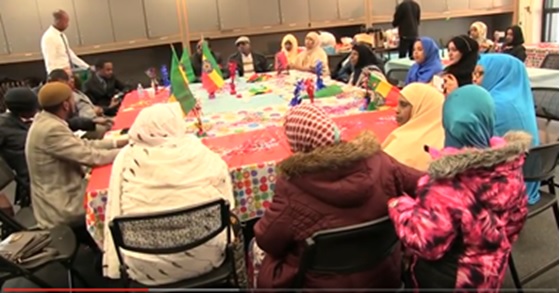By Hassan M. Abukar
Mohamed Ali, better known as Khalif Cadaawe, is angry. He believes he has been a victim of false imprisonment in the Somali Region of Ethiopia.
Born and raised in Ethiopia, Cadaawe has been in the U.S. since the mid-1990s. He is a naturalized American citizen and a respected community elder among his Gurre (Dir) clan in the U.S. A 5’8” man in his early 70s, he speaks softly but authoritatively. Wearing a baseball cap, he sat with me in a café in a major city on the West Coast while visiting his son and grandchildren. He is angry and disappointed with Abdi M. Omar, “Abdi Iley,” the president of the Somali region. In fact, Cadaawe has a painful story to tell.

Cadaawe and five of his colleagues from the Gurre clan were arrested last year in Ethiopia. They were handcuffed, chained like animals, and kept in detention for more than two weeks after they entered Ethiopia through Kenya.
“I never expected something like that to happen to me,” said Cadaawe. “My right leg still pains me.”
Cadaawe was the victim of political circumstances that left him in bewilderment. He never expected he would be the subject of an international incident for the U.S. State Department, the Ethiopian federal government, and the regional administration of the Somali region. In hindsight, Cadaawe would never have left America to visit his native country had he known what awaited him. “Not at my age,” he said and chuckled, “Are you serious?”
His travails started in the spring of last year when some of the Gurre elders, intellectuals, women, and youth activists met in Minneapolis to discuss what seemed to be a simple grievance on behalf of their people in Ethiopia. They called out the “lack of progress” in the heavily populated Gurre districts in Ethiopia such as Goro-Baqaqsa, Gurre Dhaamole, and, to a lesser extent, Qarsa duula. “We are Ethiopians,” many of them emphasized, and not opposed to the Ethiopian federal government or the administration of the Somali region. The attendees lamented the lack of development in their region—no roads, not enough schools and ambulances, and no palpable economic progress.
One elderly woman focused on what she called “the allocated budget” for the Gurre districts, which is mismanaged and unfairly distributed. Khalif Adaawe, one of the main speakers of the forum, and other participants highlighted the disenfranchisement of the Gurre as a community and their need for equal rights and free access to federal government resources. “We do not want civil war,” one of the speakers declared, but “are only interested in a peaceful way of addressing our legitimate grievances.”

Members of the Gurre community selected Cadaawe to represent them and he traveled to Kenya first to mobilize the Gurre community on his way to Ethiopia. In Nairobi, he met with members of the Gurre clan and raised money for the Grand Renaissance Dam being built in Ethiopia. On April 15, 2016, the community met with the Ethiopian Ambassador and other officials from the Ethiopian federal government. Speeches were delivered in support of the Ethiopian government, and the Gurre leaders requested that their demands for better services in the Somali region and access to power be honored. Then, Cadaawe presented a check in the sum of $20,000 from his community to the ambassador. Cadaawe told the Ethiopian officials that a delegation consisting of six members, including him, was planning to visit Ethiopia to meet with the Gurre. According to Cadaawe, the ambassador wrote a glowing recommendation letter for them, addressed to Ethiopia’s interior minister, urging the government to facilitate the needs of the delegation.
Abdi Iley was not pleased with Cadaawe and his friends met with Embassy officials and complained about him. He considered their meeting with the federal figures to be an affront to his administration.
Cadaawe and his colleagues planned to cross into Ethiopia through Kenya at the border town of Moyale. A rental bus was waiting for them to take them to Addis Ababa and then to the Gurre territory. However, something else—perhaps even tragedy—awaited them in Moyale.
Immediately after Cadaawe and his group crossed into the Ethiopian side of Moyale, they were met by armed agents of the Liyu police from the Somali region and arrested, handcuffed, and put in chains from their waist to their legs.
Cadaawe and his friends were driven through the vast territory of the Somali region unaware of the reason for their detention. “I was blanketed by shock and horror,” he said. In his mind, questions abounded: “What happened?” “What did he do?” “Was it a case of mistaken identity?” “Was he betrayed by his own people?”
For 24 hours, the detainees and their captors traveled on a long, treacherous, and unpaved road until they finally reached Goday. They were taken out of the police vehicle and he discovered—to his horror—that they were all in chains. “I was paralyzed with a gripping fear,” he said, “I thought we will be shot.” Instead, the detainees were lined up for the mass media to be shown and presented as terrorists and members of Al-Shabaab.
“Al-Shabaab terrorists!” exclaimed Cadaawe, a hint of amusement in his voice.
As the rumor mill swirled about Cadaawe’s detention among the Gurre, his family in the U.S. became concerned. News about his incarceration finally reached the federal government in Addis Ababa and frantic calls ensued asking Abdi Iley to release the delegation. At first, an official of the Somali region denied the existence of such figures in their custody. Then Cadaawe and his colleagues were secretly whisked away from Goday (and the federal government’s reach) and transferred to a small village in a remote area.
“For all practical purposes, we were kidnapped and spent 17 grueling days in detention,” said Cadaawe. They were given meager food and kept in chains. What bothered him the most was the lack of formal charges being presented against the group and the absence of due process. He said it was more like the law of the jungle.
Relatives of Cadaawe in the U.S. were not to be cowed. They immediately contacted Congressman Keith Ellison of Minnesota and sought his assistance. It was then that the American Embassy in Addis Ababa intervened on behalf of Cadaawe. Two consular officers finally came and visited him after he was transferred to Jigjiga. Additional pressure came from the Ethiopian federal government for Abdi Iley demanding the release of the Gurre delegation. However, Abdi Iley did not look like a leader perturbed and he flew to Australia for an official visit.
Cadaawe has become a target of scorn for some leaders of his clan who were allied with Abdi Iley. They see Cadaawe as a trouble maker from America bent on embarrassing Abdi Iley’s administration. Ugaas Mohamed Ugaas Guled, a Gurre chieftain, chastised Cadaawe in the harshest terms: “He is an old man who represents no one but himself,” the chieftain said. “In fact, Cadaawe is a propagandist and a product of fadhi-ku-dirir (political chatter) in the diaspora.”
In Australia, Abdi Iley finally caved in and called for his subordinates in Jigjiga to release “only the American citizen” among the detained group. American diplomats then collected Cadaawe, who was taken to Addis Ababa. “I was in poor health,” he said, and he could not afford either medical treatment or legal counsel. He later traveled to Nairobi where he spent three months recuperating, resting, and ruminating on what had happened to him in the Somali region. “I was bitter and felt utterly humiliated,” he said.
At times, Cadaawe seemed to articulate the story of his ordeal in a confident voice. Other times, he seemed fearful of the long arm of Abdi Iley. He repeated that he was neither a politician nor someone harboring political ambition. He made a distinction between his grievances of the wrong that had been meted out against him by the Liyu police and his unbridled loyalty to the Ethiopian government.
In a move to mollify the political outcry that resulted from Cadaawe’s detention among the Gurre, Abdi Iley has offered—through intermediaries—to meet with Cadaawe and other members of his community in the diaspora. It is not clear if the supposed meeting will take place anytime soon.
Cadaawe says he has no intention of suing Abdi Iley or his administration. “I am an elderly man and I want to spend the rest of my life in peace,” he said. “However, I would love to visit my relatives one day in the Somali region.” He said he is still afraid that his next visit to the region will have calamitous consequences.
Cadaawe’s story is one of many untold narratives being told about Abdi Iley’s administration, a regime that has been accused of imposing a reign of terror in the Somali region. If the goal of Cadaawe’s incarceration was to send a message to the Gurre community that no dissension will be tolerated in that region, it was heard loud and clear.
Hassan M. Abukar
—————
Hassan M. Abukar is a political analyst, a contributor to Wardheernews, and the author of Mogadishu Memoir. He can be reached at [email protected].
We welcome the submission of all articles for possible publication on WardheerNews.com. WardheerNews will only consider articles sent exclusively. Please email your article today . Opinions expressed in this article are those of the author and do not necessarily reflect the views of WardheerNews.
WardheerNew’s tolerance platform is engaging with diversity of opinion, political ideology and self-expression. Tolerance is a necessary ingredient for creativity and civility.Tolerance fuels tenacity and audacity.
WardheerNews waxay tixgelin gaara siinaysaa maqaaladaha sida gaarka ah loogu soo diro ee aan lagu daabicin goobo kale. Maqaalkani wuxuu ka turjumayaa aragtida Qoraaga loomana fasiran karo tan WardheerNews.
Copyright © 2024 WardheerNews, All rights reserved


